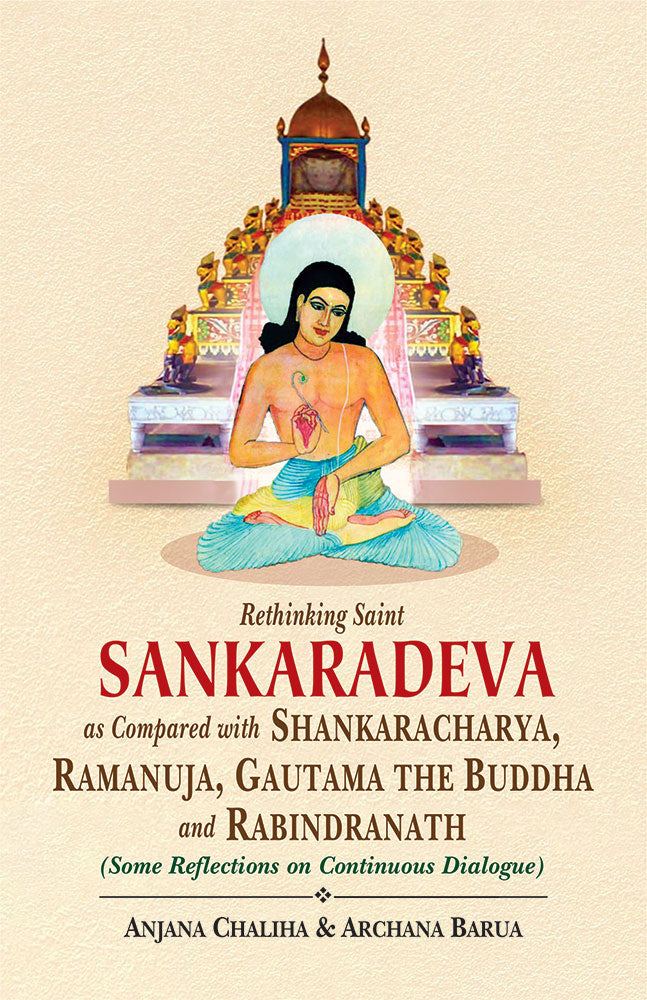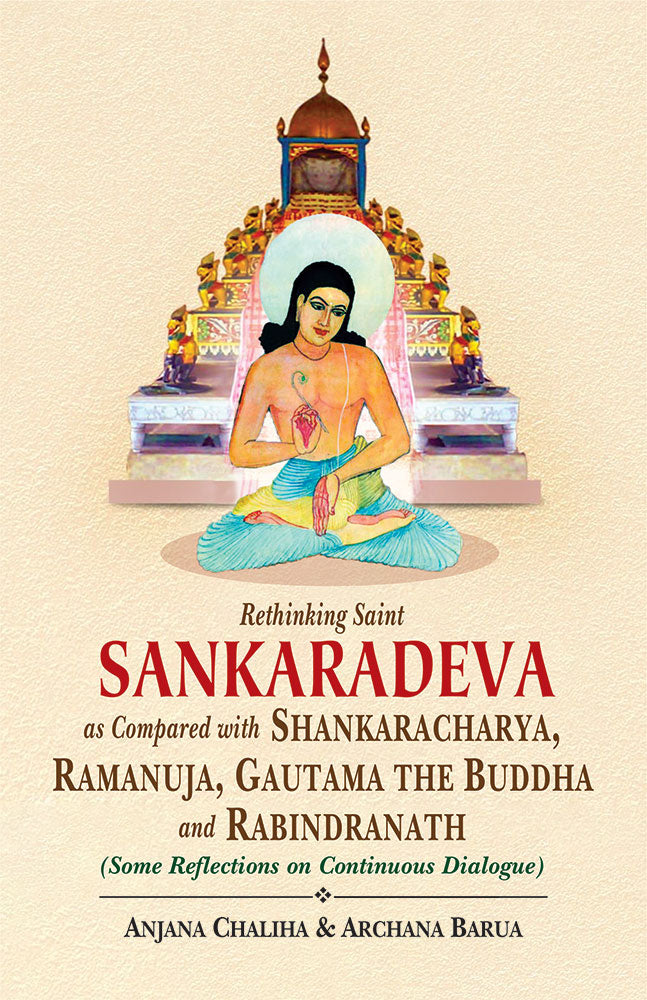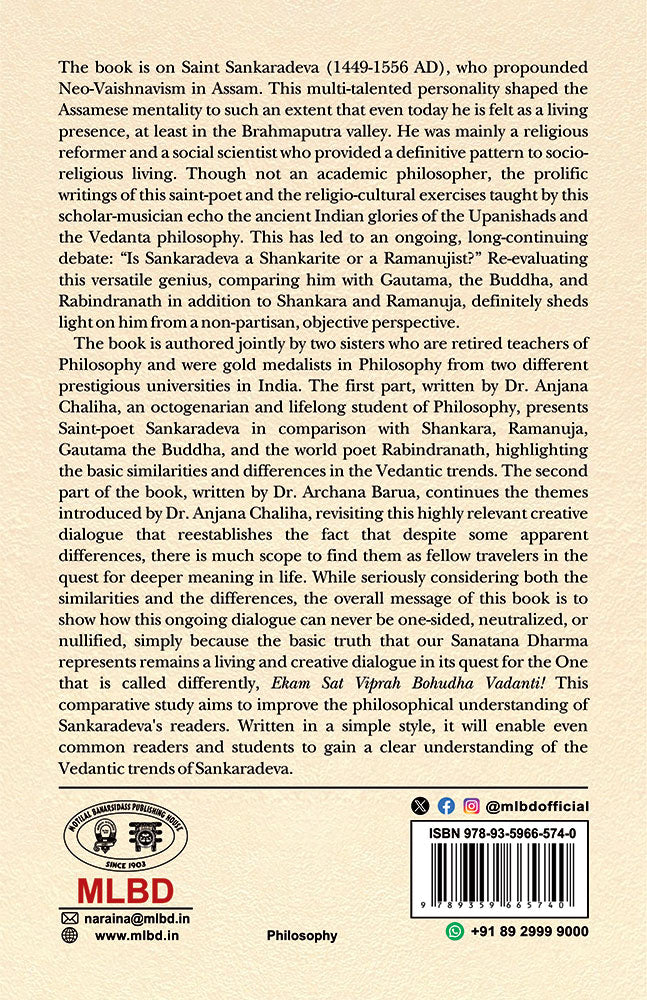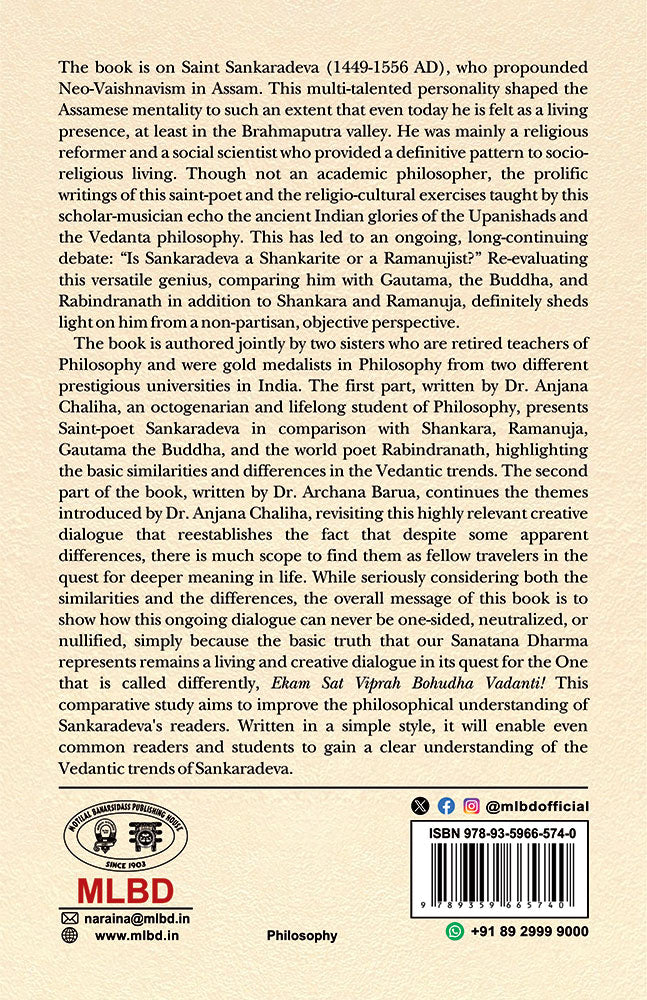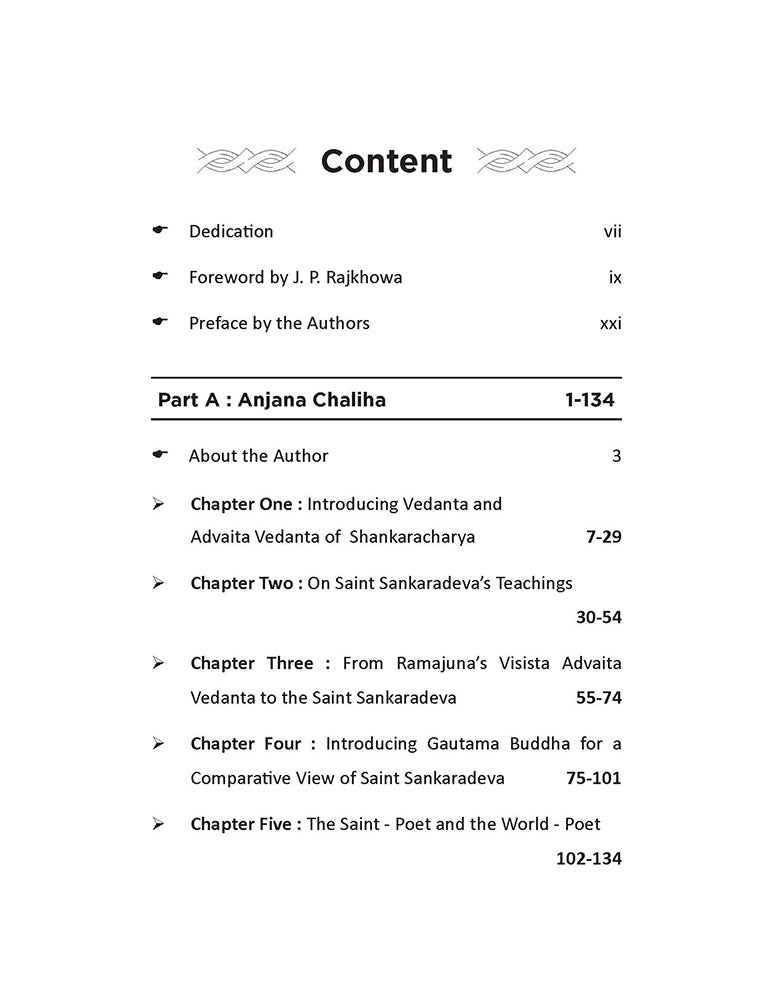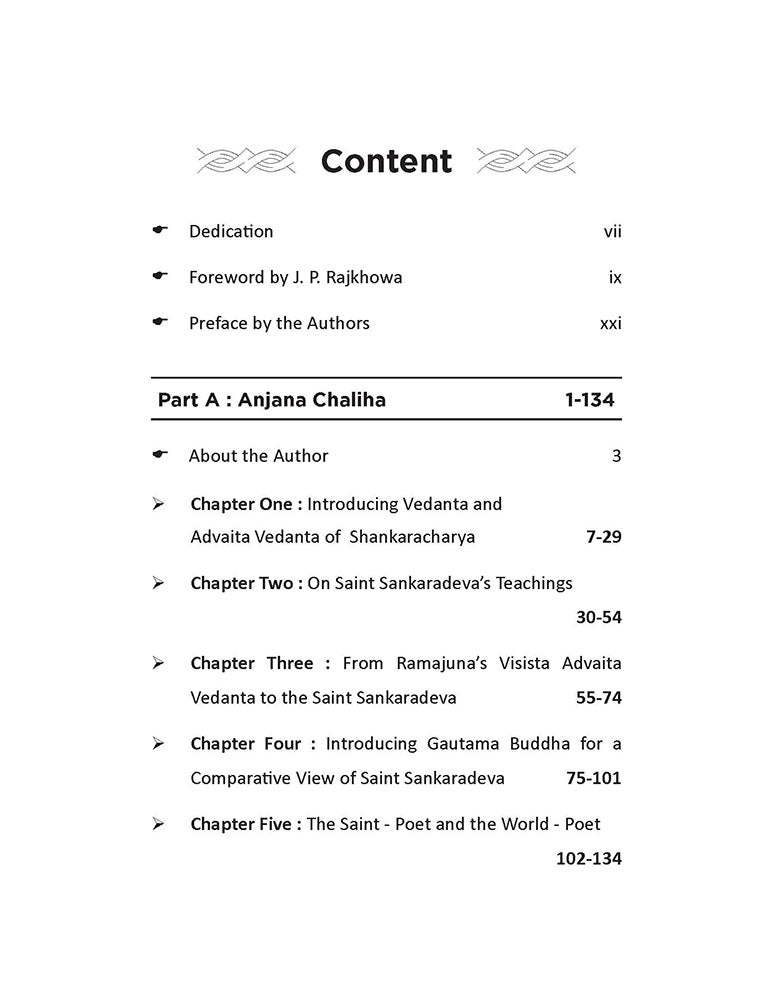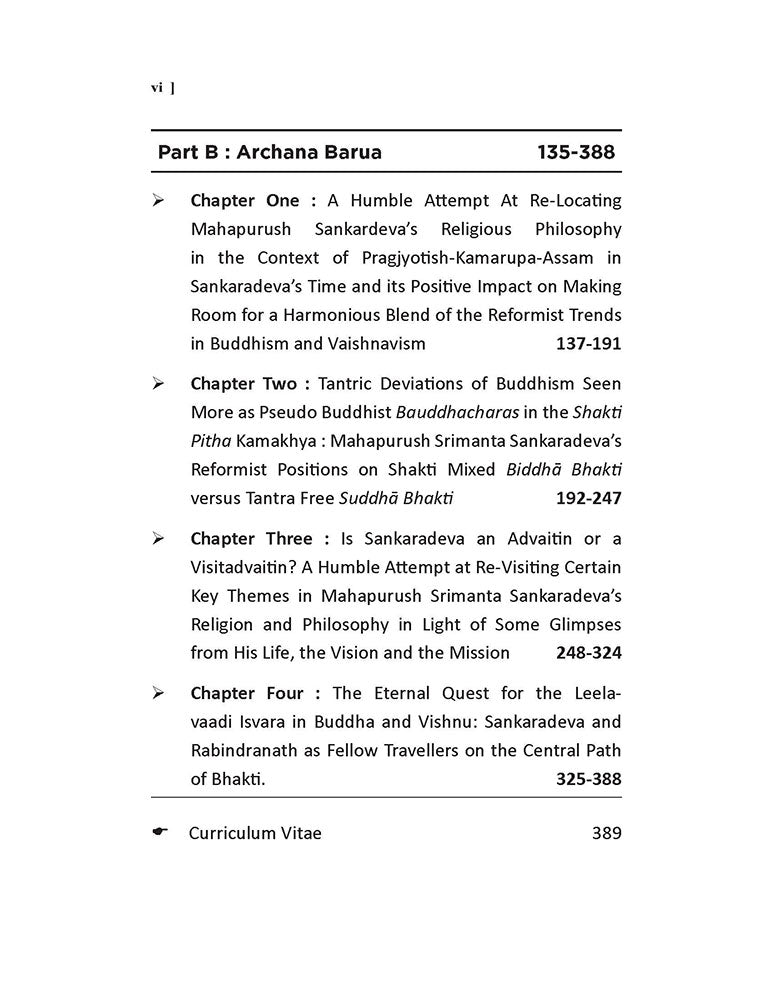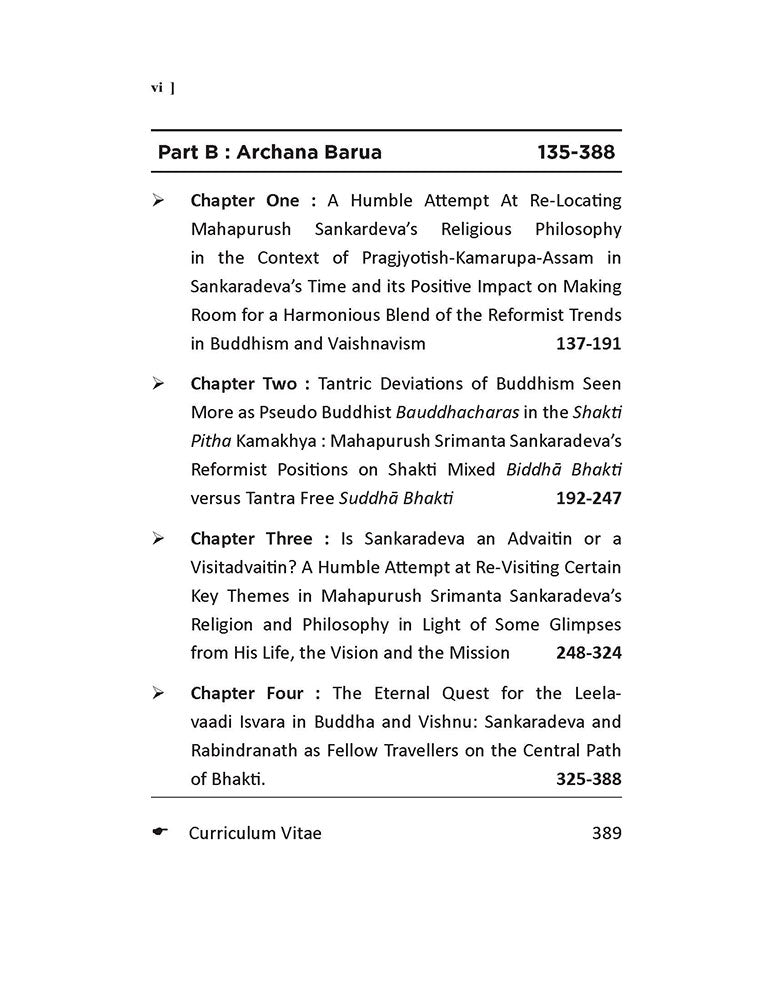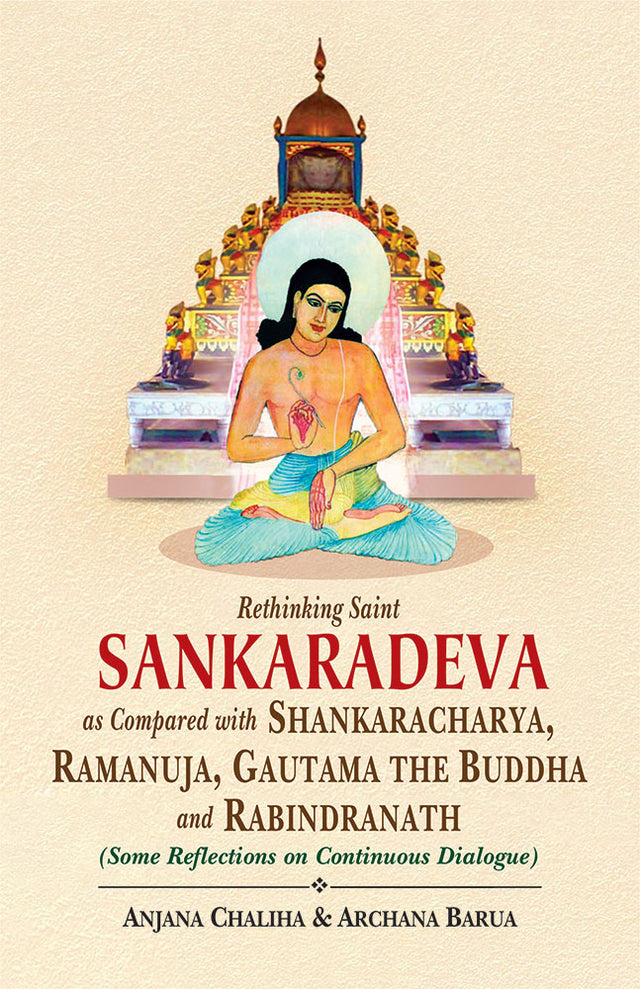Rethinking Saint Sankaradeva as Compared with Shankaracharya, Ramanuja, Gautama the Buddha and Rabindranath (Some Reflections on Continuous Dialogue)
Rethinking Saint Sankaradeva as Compared with Shankaracharya, Ramanuja, Gautama the Buddha and Rabindranath (Some Reflections on Continuous Dialogue) - Paperback is backordered and will ship as soon as it is back in stock.
Couldn't load pickup availability
The book is on Saint Sankaradeva (1449-1556 AD), who propounded Neo-Vaishnavism in Assam. This multi-talented personality shaped the Assamese mentality to such an extent that even today he is felt as a living presence, at least in the Brahmaputra valley. He was mainly a religious reformer and a social scientist who provided a definitive pattern to socio- religious living. Though not an academic philosopher, the prolific writings of this saint-poet and the religio-cultural exercises taught by this scholar-musician echo the ancient Indian glories of the Upanishads and the Vedanta philosophy. This has led to an ongoing, long-continuing debate: "Is Sankaradeva a Shankarite or a Ramanujist?" Re-evaluating this versatile genius, comparing him with Gautama, the Buddha, and Rabindranath in addition to Shankara and Ramanuja, definitely sheds light on him from a non-partisan, objective perspective.
The book is authored jointly by two sisters who are retired teachers of Philosophy and were gold medalists in Philosophy from two different prestigious universities in India. The first part, written by Dr. Anjana Chaliha, an octogenarian and lifelong student of Philosophy, presents Saint-poet Sankaradeva in comparison with Shankara, Ramanuja, Gautama the Buddha, and the world poet Rabindranath, highlighting the basic similarities and differences in the Vedantic trends. The second part of the book, written by Dr. Archana Barua, continues the themes introduced by Dr. Anjana Chaliha, revisiting this highly relevant creative dialogue that reestablishes the fact that despite some apparent differences, there is much scope to find them as fellow travelers in the quest for deeper meaning in life. While seriously considering both the similarities and the differences, the overall message of this book is to show how this ongoing dialogue can never be one-sided, neutralized, or nullified, simply because the basic truth that our Sanatana Dharma represents remains a living and creative dialogue in its quest for the One that is called differently, Ekam Sat Viprah Bohudha Vadanti! This comparative study aims to improve the philosophical understanding of Sankaradeva's readers. Written in a simple style, it will enable even common readers and students to gain a clear understanding of the Vedantic trends of Sankaradeva.
About the Author's:
The author of the part A of the book, Dr. Anjana Chaliha is a retired Principal and ex-HOD Philosophy Department, J.B. College, Jorhat. A gold-medallist in her M.A. examination (1965) from Gauhati University, she was also a topper in philosophy Honours in her B.A. examinations, and later earned her doctorate degree from Viswabharati in 1998 for her thesis titled 'The concepts of Transcendence and Immanence in Sankaradeva and Rabindranath.
Dr. Chaliha served as a lecturer in Philosophy (1965 1994), as HOD of Philosophy Department (1994-2001), and as the principal of the J.B. College (2001-2003). During her tenure as the Head of Department, she could elevate the dept. into the post graduate level, a rare achievement indeed, at a time, when there was no post-graduate philosophy course in the university (Dibrugarh) itself. She is the only Lady Principal in the long history of the prestigious institution (established in 1930), which has now been granted the status of a university. She has been a member of Board of Studies, Philosophy, of both the Dibrugarh and Gauhati University. Dr. Chaliha has been associated with several Governing Bodies of the nearby Colleges as a member, as a V.C.'s nominee or as the President. After her retirement in 2003, she worked as a Guest Teacher in the P.G Dept. Philosophy, J.B. College. From 2003 up to 2021 she acted as Research Guide in Philosophy with Dibrugarh University. She is presently associated with Jagannath Barooah College, (Autonomous), Jorhat as member of its Board of Studies Philosophy. Besides, Dr. Chaliha served as a Visiting Professor at Mahapurush Srimanta Sankaradev Viswavidyalaya Nagaon.
Her areas of interest include different branches of Indian Philosophy, Philosophy of Religion including Vaishnavism, History of Western Philosophy, Philosophy of Mind and Psychology etc. She published several books and her publications are related with the areas of epistemology, metaphysics, Religion, History of western philosophy. different systems of Indian Philosophy, Bhagavadgita, Vaishnavism etc. Some of these are like Bhababad aru Prapancabad, Greek Darshanar Itihas (Vol 1 and Vol II), Snatak Pachatya Darshan, Gita Anvexan, Srimanta Malita etc, translated works like Bhagavat Puranat Advaita Iswarbad, Radhakrishnanar Gitar Bhumika, edited works like Causality and Freedom etc.
She was also the President, Assam Philosophical Forum in 1989, a sister organisation of Muktodhara Cultural Association, Gauhati. Later on she started two separate Philosophical Forums in J.B. College for the undergraduate and Post graduate students of Philosophy aiming at students' involvements in philosophical seminars. Till today she is associated as advisor of Beekshan, the philosophical journal of J.B. College which first saw publication under her initiative.
Dr. Archana Barua served as a Professor in IIT Guwahati till her retirement in 2020. Starting her teaching career from Saint Anthony's College, Shillong, as the Head, Department of Philosophy, she joined IIT Guwahati in 1998 to teach Philosophy to engineers and to guide research scholars from various disciplines. After her retirement from IIT Guwahati, Prof. Barua joined Assam Don Bosco University as Professor and Head, Department of Philosophy, Comparative Religion and North East Studies, and served there till 2022.
Her field of interest is Twentieth Century European Philosophy, especially Phenomenology (Edmund Husserl) and its development in Martin Heidegger; Existentialism (Sartre, Merleau-Ponty); the Hermeneutics of Paul Ricoeur. With a brilliant academic career from her school days, Prof. Barua topped the list of successful candidates in both her graduate and post-graduate degree courses. A recipient of the 'University (NEHU) Gold Medal' in M.A. (Philosophy) from the-then Prime Minister of India, Smt. Indira Gandhi, Barua received her doctoral degree from the same University in 1991. It is her privilege that the renowned Phenomenologist, Professor Jitendra Nath Mohanty wrote the "Foreword" of her book, 'Phenomenology of Religion', published by "Lexington Books' in 2008 (Rowman & Littlefield).
Published in 2004, by 'Punthi Publishers', Kolkata, "The Tradition of Religion in Assam, a Philosophical Study", is based on her doctoral research in the field of "Eka Sarana Naam Dharma", founded by Mahapurush Srimanta Sankaradeva in Assam. Besides this book, she covered various aspects of Sankaradeva's philosophy in her research articles. Her Invited Talk in a comparative religious forum organised at Assumption University, Bangkok, Thailand on "Mahapurush Sankaradeva and the Bhakti Renaissance in Assam in Light of the Phenomenology of Religious Experience", was published in Prajñā Vihāra, Journal of Philosophy and Religion, Vol. 14 No. 1-2 (2013). With her keen interest in Gandhian Philosophy, she contributed in this area with her regular publications including renowned Gandhi scholar Terry Beitzel's last edited Book (Co-edited with Chandrakant Langare Reflections on the Mahtama Gandhi (2021) with her article, "Religion is like a 'Homespun Shawl'? Re-visiting Moral, Spiritual and Humanitarian Dimension of Religion from a Bhakti centric Perspective of the Mahatma". Some other publications in National and International journals cover areas of Phenomenology, Feminist Study, Philosophy of Culture and Science, Technology and Philosophy.
As a literary person, Barua is a published Indian poet. Her collection of Assamese Poems "Tumi noi hoi bo'bore poraa ('Be a river: you flow...')" has its priceless foreword written by Jñänpith and Sahitya Academy Awards recipient, and a distinguished literary figure in Assam and India, Dr. Indira Goswami, popularly known as Dr. Mamani Roisham Goswami!Dr. Archana Barua served as a Professor in IIT Guwahati till her retirement in 2020. Starting her teaching career from Saint Anthony's College, Shillong, as the Head, Department of Philosophy, she joined IIT Guwahati in 1998 to teach Philosophy to engineers and to guide research scholars from various disciplines. After her retirement from IIT Guwahati, Prof. Barua joined Assam Don Bosco University as Professor and Head, Department of Philosophy, Comparative Religion and North East Studies, and served there till 2022.
Her field of interest is Twentieth Century European Philosophy, especially Phenomenology (Edmund Husserl) and its development in Martin Heidegger; Existentialism (Sartre, Merleau-Ponty); the Hermeneutics of Paul Ricoeur. With a brilliant academic career from her school days, Prof. Barua topped the list of successful candidates in both her graduate and post-graduate degree courses. A recipient of the 'University (NEHU) Gold Medal' in M.A. (Philosophy) from the-then Prime Minister of India, Smt. Indira Gandhi, Barua received her doctoral degree from the same University in 1991. It is her privilege that the renowned Phenomenologist, Professor Jitendra Nath Mohanty wrote the "Foreword" of her book, 'Phenomenology of Religion', published by "Lexington Books' in 2008 (Rowman & Littlefield).
Published in 2004, by 'Punthi Publishers', Kolkata, "The Tradition of Religion in Assam, a Philosophical Study", is based on her doctoral research in the field of "Eka Sarana Naam Dharma", founded by Mahapurush Srimanta Sankaradeva in Assam. Besides this book, she covered various aspects of Sankaradeva's philosophy in her research articles. Her Invited Talk in a comparative religious forum organised at Assumption University, Bangkok, Thailand on "Mahapurush Sankaradeva and the Bhakti Renaissance in Assam in Light of the Phenomenology of Religious Experience", was published in Prajñā Vihāra, Journal of Philosophy and Religion, Vol. 14 No. 1-2 (2013). With her keen interest in Gandhian Philosophy, she contributed in this area with her regular publications including renowned Gandhi scholar Terry Beitzel's last edited Book (Co-edited with Chandrakant Langare Reflections on the Mahtama Gandhi (2021) with her article, "Religion is like a 'Homespun Shawl'? Re-visiting Moral, Spiritual and Humanitarian Dimension of Religion from a Bhakti centric Perspective of the Mahatma". Some other publications in National and International journals cover areas of Phenomenology, Feminist Study, Philosophy of Culture and Science, Technology and Philosophy.
As a literary person, Barua is a published Indian poet. Her collection of Assamese Poems "Tumi noi hoi bo'bore poraa ('Be a river: you flow...')" has its priceless foreword written by Jñänpith and Sahitya Academy Awards recipient, and a distinguished literary figure in Assam and India, Dr. Indira Goswami, popularly known as Dr. Mamani Roisham Goswami!
-
Pages
-
Edition
-
Size
-
Condition
-
Language
-
Weight (kg)
-
Publication Year
-
Country of Origin
-
Territorial Rights
-
Reading Age
-
HSN Code
-
Publisher

